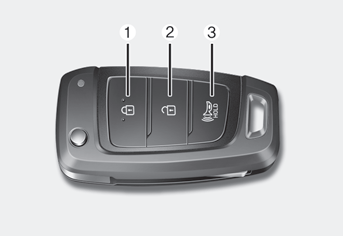Hyundai Venue: Cooling System / Coolant. Repair procedures
Hyundai Venue (QX) (2020-2025) Service Manual / Engine Mechanical System / Cooling System / Coolant. Repair procedures
| Replacement and Air Bleeding |
|
|
| 1. |
Make sure the engine and radiator are cool to the touch.
|
| 2. |
Remove the radiator cap (A).
|
| 3. |
Remove the engine room under cover.
|
| 4. |
Loosen the drain plug (A), and drain the coolant.
|
| 5. |
Tighten the radiator drain plug securely.
|
| 6. |
After draining engine coolant in the reservoir tank, clean the tank.
|
| 7. |
Fill the radiator with water through the radiator cap and tighten the
cap.
|
| 8. |
Start the engine and allow to come to normal operating temperature.
Wait for the cooling fans to turn on several times.
Accelerate the engine to aid in purging trapped air. Shut engine off.
|
| 9. |
Wait until the engine is cool.
|
| 10. |
Repeat steps 1 to 8 until the drained water runs clear.
|
| 11. |
Fill fluid mixture with coolant and water (55-60%) (except for North
America, Europe and China : 45-50%) slowly through the radiator cap.
Push the upper/lower hoses of the radiator so as bleed air easily.
|
| 12. |
Start the engine and run until coolant circulates.
When the cooling fan operates and coolant circulates, refill coolant
through the radiator cap.
|
| 13. |
Repeat 11 until the cooling fan 3 - 5 times and bleed air sufficiently
out of the cooling system.
|
| 14. |
Install the radiator cap and fill the reservoir tank to the "MAX" (or
"F") line with coolant.
|
| 15. |
Run the vehicle under idle until the cooling fan operates 2 - 3 times.
|
| 16. |
Stop the engine and wait coolant gets cool.
|
| 17. |
Repeat 10 to 15 until the coolant level doesn't fall any more, bleed
air out of the cooling system.
|
Other information:
Hyundai Venue (QX) (2020-2025) Owners Manual: Emergency Towing
Front Rear If towing is necessary, we recommend you have it done by an authorized HYUNDAI dealer or a commercial tow truck service. If towing service is not available in an emergency, your vehicle may be temporarily towed using a cable or chain secured to the emergency towing hook at the front (or rear) of the vehicle...
Hyundai Venue (QX) (2020-2025) Owners Manual: Wipers and Washers
Front windshield wiper/washer Rear windshield wiper/washer A. Wiper speed control MIST – Single wipe OFF – Off INT – Intermittent wipe LO– Low wiper speed HI – High wiper speed B. Intermittent control wipe time adjustment C...
Categories
- Manuals Home
- 1st Generation Venue Owners Manual
- 1st Generation Venue Service Manual
- Shift-lock system, Shift-lock release, Parking
- Operating Door Locks from Outside the Vehicle
- Remote start
- New on site
- Most important about car
Remote Key

Your HYUNDAI uses a remote key, which you can use to lock or unlock the driver and passenger doors or the rear liftgate.
(1) Door Lock
(2) Door Unlock
(3) Panic
Locking Your Vehicle
To lock your vehicle:
1. Make sure all doors, the engine hood and the liftgate are closed.
Copyright © 2025 www.hvenueqx.com










